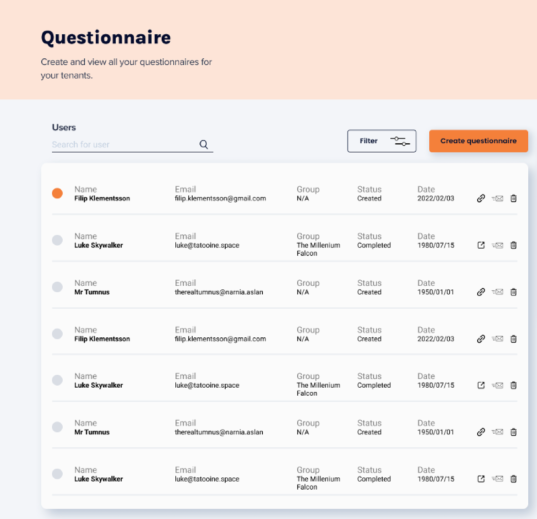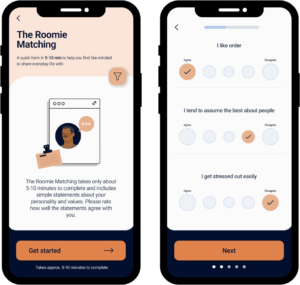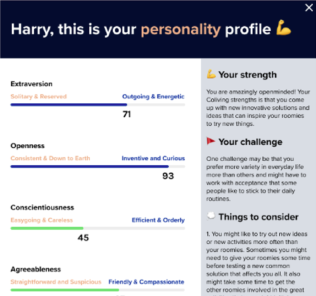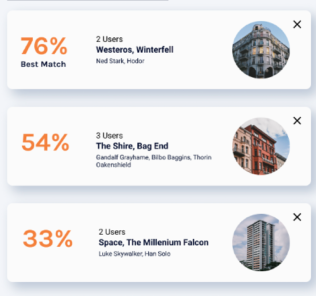What is Coly ME?
Coly Matching Engine (Coly ME) is a scientifically based matching algorithm that enhances social functioning in shared living. The tool:
- Helps you match tenants based on personalities and values.
- Provides unique profiles for each tenant. And, it also offers tailored advice to consider when living closely with other people.
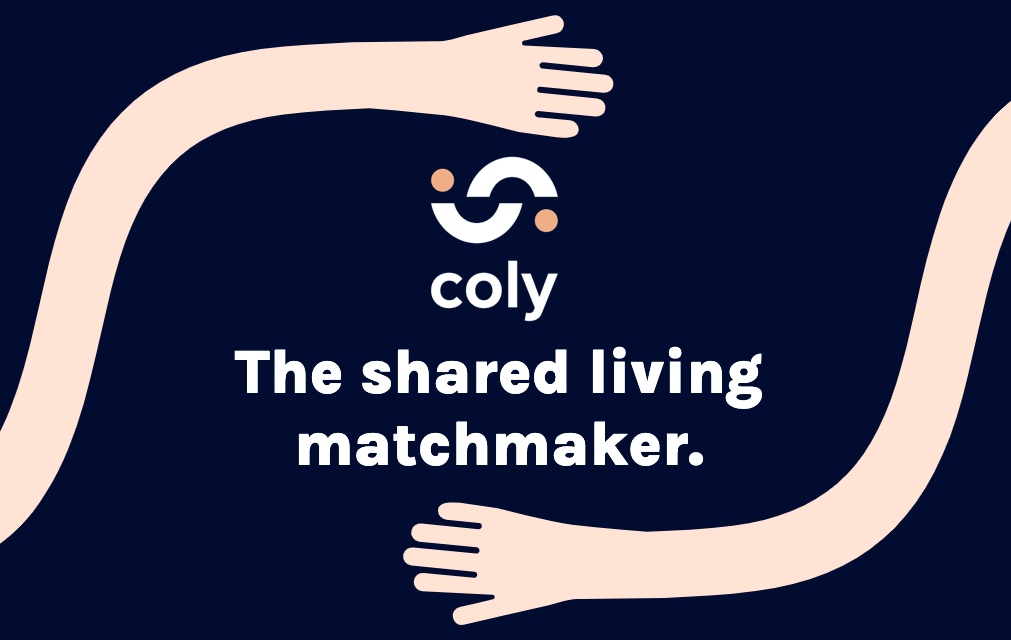
On this page, you can learn how Coly ME works and read about its characteristics and benefits. If you are curious, you can also learn about the research and development behind it. Finally, you can explore a case study and testimonials of Coly ME in use in Sweden.
How Coly ME Works: An Easy 4 Step Matching Solution
Characteristics and Benefits of Coly Matching Engine
- Scientifically based and data-driven: Through a short psycometric test, the Coly ME gathers information about a tenant’s preferences, personality, and traits. The psycometric test has been developed based on extensive research and best practices. This data is then used to produce a tailored profile with insights and guidance.
- Fully Automatic and time effective: The Coly ME tool has been designed for efficient use. Tenants who answer the psycometric test will automatically receive their profile. The matching element is also automatized. These automatizations support you when it’s time to scale up operations.
- Easily implementable with a Web App and API: Coly ME has an inbuilt API (Application Programming Interface), which makes it simple to integrate the tool with your platform. In addition, Coly ME offers a web app and admin console for easy back-end use.
- Personalized expectation management and tailored advice: The Coly ME platform gives each tenant a personalized profile and corresponding toolbox. This includes a list of personality traits, values, and associated strengths that can be applied in the coliving context. In addition, it lists potential challenges as well as advice on how to overcome these challenges. For instance, it can include exercises for coping with stress and anxiety, setting up SMART goals, strengthening social skills, and handling perfectionism. Tenants are encouraged to use their specific strengths to help others. Furthermore, the tailored unique advice is a social intervention, providing psychological advice specific for each person.
- A shared vocabulary for tenants: Through the profiles, tenants are empowered with a shared vocabulary to better understand their own and others’ needs. As an example, a person with high levels of extroversion may learn to interpret an introverted person’s preferences not as a rejection but rather as an opportunity to go for a one-to-one coffee or walk outside. Consequently, this can contribute to more efficient conflict resolution and stronger social connections.
Research and Development of Coly ME
The team behind Coly ME developed the algorithm based on a variety of factors and inputs. Two of the biggest factors are personality and values. Personality refers to individual differences in characteristic patterns of thinking, feeling, and behaving.
To capture information on tenant personality, the Coly ME team developed measurements based on the Five-Factor Model, perhaps the most widely accepted personality theory. In brief, each of the Big Five personality traits represents broad categories that cover many personality traits. Specifically, the big five categories of personality are:
- Openness
- Conscientiousness
- Extraversion
- Agreeableness
- Neuroticism
In addition, the Coly ME team wanted to measure where tenants stand on different values. And a value is a moral or social principle accepted by an individual or society. According to the Schwartz theory of basic human values, there are ten universal values. Specifically, these are universalism, benevolence, conformity, tradition, security, power, achievement, hedonism, stimulation, and self-direction.
Coly ME uses the same methods for analyzing the test tools as the neuropsychological assessment methods WAIS. To this end, Classical Test theory is used and each tenant’s test results are compared to a norm group. In brief, a tenant not only gets their score, but they also get information about how much of a particular characteristic they have compared to the rest of the population. Thus, tenants can easily and meaningfully compare their results with each other.
The algorithm of Coly ME is continuously adapted with frequent iterations to optimize the matching process. Coly Technologies is also currently working with machine learning which will be implemented in Q3 – 2022. This allows for the model to be even more flexible and to continuously progress to be better and better with time and data.
Validity and Reliability of the Tool
Several data collections and statistical analyses have been performed to guarantee the Coly ME quality of the tests.
For instance, reliability captures the trustworthiness or consistency of a measure. The internal reliability of the Coly ME test is very high for all of the personality scales. The results show the same values of test quality as the golden Revised NEO Personality Inventory, one of the two most widely used personality inventories in psychological research.
In addition, Coly ME scores high on the validity of its tests. To illustrate, convergent validity refers to the degree to which two measures that theoretically should be related, are related. Coly ME measured this aspect of the testing in collaboration with Alva Labs, a candidate assessment platform that uses psychometric testing. More than 300 people completed both the Coly ME and the Alva test and got similar results. In addition, Coly ME achieved High Convergent validity with the NEO Personality Inventory in a sample of 100 students. Finally, confirmatory factor analysis has verified that the test structure corresponds accurately with the Five-Factor Model.
To sum up, Coly ME incorporates evidence-based psychological test instruments that are validated according to global standards in psychometric test quality.
Detailed results will be published in Coly Technical Manual 2022.
Coly ME Case Study
The Coly ME tool has been in use for 3+ years at Colive, Sweden’s largest coliving company.
Tenants and staff using the structured matching method speak highly about its social impact. Below are a few testimonials.

It's a lot more comforting to know that you are not just put in with some random person from the internet... like there is a reason for why you are with the people you live with.”
- Robyn, Colive tenant
At Colive, we use the matching tool to systematically create groups that work best together. We see that our tenants talk together about and request profiles to better understand themselves and the other tenants."
- Katarina Liljestam Beyer, Co-Founder & CEO. Colive
Significant findings from onsite analyses:
Coly has performed numerous statistical analyses in collaboration with Colive. The main result was that Coly ME matching can significantly improve both social function in coliving apartments as well as customer satisfaction measured with Net Promoter Score. Other statistically significant findings include:
- Quality is more important than quantity in terms of activities impacting wellbeing and feeling of home.
- A strong sense of community is strongly associated with a feeling of home and NPS
- Both friction and conflicts are moderately strongly related to whether one feels at home. Fewer conflicts are associated with more feeling at home.
- A good ability to handle conflicts is more important for well-being than the actual number of conflicts (friction, personality clashes).
- General high social function in the apartments is very important for feeling at home in Colive and for well-being (NPS, Satisfaction in Colive).
- Getting along well in the roomie group has a moderately strong connection with NPS and is satisfied with the accommodation in Colive in general.
- Satisfaction with routines and how the group interacts is more strongly connected to living satisfaction than the number of activities or time spent with the group. That indicates that routines and everyday living interactions are more important than the number of external activities.
